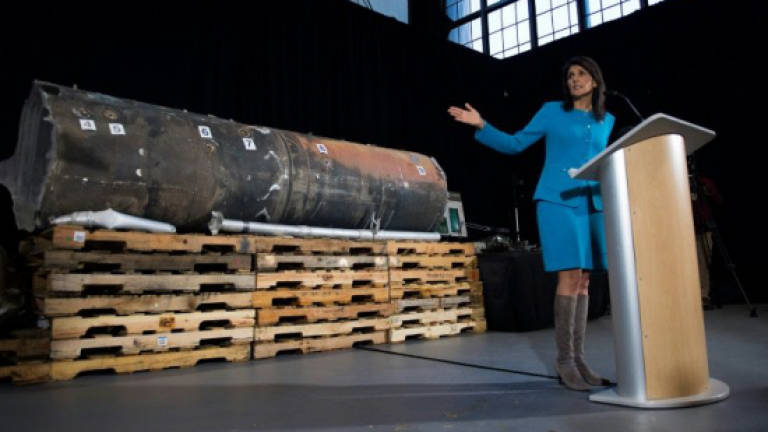Iran supplied ballistic missile to Yemen rebels: US

WASHINGTON: US ambassador to the United Nations Nikki Haley presented what she called "undeniable" evidence Thursday that a ballistic missile fired by Huthi rebels in Yemen at Saudi Arabia last month was Iranian-made, a charge Tehran immediately denied.
Haley accused Tehran of a "blatant violation" of UN Security Council obligations designed to rein in its missile activity, further stepping up the rhetoric towards Iran which Washington accuses of going against the spirit of a historic nuclear accord.
Standing in a warehouse at a Washington military base in front of recovered pieces of two missiles, Haley said Iranian fingerprints were all over the weapons, one of which she said was fired at Riyadh's airport on Nov 4.
"It was made in Iran then sent to Huthi militants in Yemen," Haley said.
"From there it was fired at a civilian airport with the potential to kill hundreds of innocent civilians in Saudi Arabia."
She charged that the 2015 nuclear deal to curb Iran's nuclear program had "done nothing to moderate the regime's conduct in other areas", and accused Tehran of "fanning the flames" of regional conflict.
Alireza Miryousefi, spokesman at Iran's mission to the United Nations, said Tehran "categorically" rejects the US claims.
"This purportedly evidence, put on public display today, is as much fabricated as the one presented on some other occasions earlier," he said.
Iranian Foreign Minister Mohammad Javad Zarif posted on Twitter a photo of Haley juxtaposed with a well-known image of former secretary of state Colin Powell appearing before the Security Council, where he provided intelligence in the run-up to the 2003 Iraq war that was later found to be false.
"When I was based at the UN, I saw this show and what it begat...," Zarif wrote.
The Iranian mission said the accusations levelled by Haley were intended to divert attention from the devastating war in Yemen being led by Saudi Arabia, a key US ally.
Tougher stance
A confidential report to the council says UN officials had examined debris from missiles fired at Saudi Arabia which pointed to a "common origin" but there was no firm conclusion as to whether they came from an Iranian supplier.
Haley said the missiles were Iranian Qiam-class short-range ballistic rockets and pointed to valves that she said proved their origin. The Qiam-1 is based on a modified Scud design.
Haley also showed other pieces of military materiel she said were provided by Iran, and after her announcement officials showed journalists pieces of an anti-tank missile, an explosive boat, drones and other gear.
"The evidence is undeniable. The weapons might as well have had 'Made in Iran' stickers all over it," Haley said.
"These are Iranian-made, these are Iranian-sent and these are Iranian-given, in violation of the Security Council," she said.
Haley has called on the UN Security Council to take a tougher stance toward Iran, accusing Tehran of making illegal arms deals in Yemen, Lebanon and Syria.
Asked about Haley's claims that the evidence that Iran had supplied the missile was irrefutable, Sweden's UN Ambassador Olof Skoog said "she may be in possession of evidence that I have not seen. The information that I have up to now is less clear."
Haley did not discuss the timeline of when Iran is supposed to have provided the weapons, or whether this may have happened before the nuclear deal was signed.
'Bleeding Saudi Arabia of money'
The report from UN Secretary-General Antonio Guterres, obtained by AFP, said officials were still analysing the information.
A separate team of UN experts who inspected the missile fragments during a visit to Riyadh last month found a possible link to an Iranian manufacturer, the Shahid Bagheri Industrial Group, which is on the UN sanctions blacklist.
The experts, who report to the sanctions committee, found a component marked by a logo similar to that of the banned group, which is a subsidiary of the Iranian Aerospace Industries Organisation.
In his report, Guterres said officials had seen the logo but that they were still analysing the information.
Behnam Ben Taleblu, senior Iran analyst for the Foundation for Defence of Democracies, told AFP that Iran's apparent willingness to risk transferring missiles to the Huthis indicates that the Yemeni theatre "may not be as peripheral to Tehran as previously assumed".
"Bleeding Saudi Arabia of money and men is a clear goal for Iran as it continues its war in Yemen," he said in an email.
Aside from leading a military campaign in Yemen, Saudi Arabia has deployed expensive Patriot missiles at home to guard against incoming rockets.
Recent Iranian missile launches have triggered US sanctions and accusations they violate the spirit of a 2015 nuclear deal between Tehran and major powers.
"Today's revelations proved yet again that Iran's dangerous presence in the Middle East is only growing despite their attempts to deceive the world," Israel's ambassador to the UN Danny Danon said in a statement.
A Saudi-led coalition fighting rebels in Yemen imposed a blockade of Yemen's air and sea ports and borders after the missile was fired at Riyadh, citing concerns that weapons were being smuggled into Yemen. — AFP